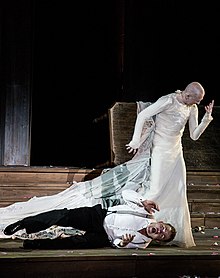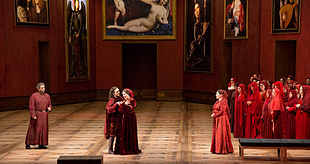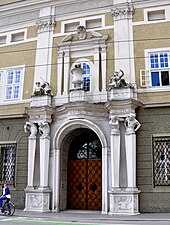Salzburg Festival
| Salzburg Festival Salzburger Festspiele | |
|---|---|
 | |
| Genre |
|
| Begins | late July |
| Ends | end of August |
| Frequency | annual |
| Location(s) | Salzburg,Austria |
| Inaugurated | 1920 |
| People | |
| Website | www |
TheSalzburg Festival(German:Salzburger Festspiele) is a prominentfestivalof music and drama established in 1920. It is held each summer, for five weeks starting in late July, inSalzburg,Austria, the birthplace ofWolfgang Amadeus Mozart.Mozart's operas are a focus of the festival; one highlight is the annual performance of Hofmannsthal's playJedermann(Everyman).
Since 1967, an annualSalzburg Easter Festivalhas also been held, organized by a separate organization.
History[edit]
Music festivals were held in Salzburg at irregular intervals since 1877 by theInternational Mozarteum Foundationbut were discontinued in 1910. A festival was planned for 1914, but it was cancelled at the outbreak ofWorld War I.In 1917, Friedrich Gehmacher and Heinrich Damisch formed an organization known as theSalzburger Festspielhaus-Gemeindeto establish an annual festival of drama and music, emphasizing especially the works of Mozart.[1]At the close of the war in 1918, the festival's revival was championed by five men now regarded as its founders:[2]the poet and dramatistHugo von Hofmannsthal,the composerRichard Strauss,thescenic designerAlfred Roller,the conductorFranz Schalk,and the directorMax Reinhardt,then intendant of theDeutsches TheaterinBerlin,who had produced the first performance of Hofmannsthal's playJedermannat the BerlinZirkus Schumannarena in 1911.
According to Hofmannsthal's political writings, the Salzburg Festival, as a counterpart to the Prussian-North German uncompromising worldview, should emphasize the centuries-old Habsburg principles of "live and let live" with regard to ethnic groups, peoples, minorities, religions, cultures and languages.[3][4][5]The Salzburg Festival was officially inaugurated on 22 August 1920 with Reinhardt's performance of Hofmannsthal'sJedermannon the steps ofSalzburg Cathedral,starringAlexander Moissi.The practice has become a tradition, and the play is now always performed at Cathedral Square; since 1921 it has been accompanied by several performances ofchamber musicandorchestralworks. The first operatic production came in 1922, withMozart'sDon Giovanniconducted by Richard Strauss. The singers were mainly drawn from theWiener Staatsoper,includingRichard Tauberin the part of Don Ottavio.

The first festival hall was erected in 1925 at the formerArchbishops'horse stables on the northern foot of theMönchsbergmountain, on the basis of plans byClemens Holzmeister;it opened withGozzi'sTurandotdramatized byKarl Vollmöller.At that time the festival had already developed a large-scale program including live broadcasts by the AustrianRAVAGradio network. The following year the adjacent former episcopalFelsenreitschuleriding academy, carved into the Mönchsberg rock face, was converted into a theater, inaugurated with a performance ofThe Servant of Two MastersbyCarlo Goldoni.In the 21st century, the original festival hall, suitable only for concerts, was reconstructed as a third venue for fully staged opera and concert performances and reopened in 2006 as theHaus für Mozart(House for Mozart).
During the years from 1934 to 1937, famed conductors such asArturo ToscaniniandBruno Walterconducted many performances. In 1936, the festival featured a performance by theTrapp Family Singers,whose story was later depicted in the musicalThe Sound of Music(featuring a scene of the Trapp Family singing at theFelsenreitschule,but inaccurately set in 1938). In 1937,Boyd Neeland his orchestra premieredBenjamin Britten'sVariations on a Theme of Frank Bridgeat the festival.[6]
The festival's popularity suffered a major blow as a consequence of theAnschluss,the annexation of Austria byNazi Germanyin 1938. Toscanini resigned in protest, artists of Jewish descent like Reinhardt andGeorg Soltihad to emigrate, andJedermann,last performed byAttila Hörbiger,had to be dropped. Nevertheless, the festival remained in operation until in 1944 it was cancelled by the order of Reich MinisterJoseph Goebbelsin reaction to the20 July plot.At the end ofWorld War II,the Salzburg Festival reopened in summer 1945 immediately after theAllied victory in Europe.
Post World War II festivals[edit]

The post-war festival slowly regained its prominence as a summer opera festival, especially for works by Mozart, with conductorHerbert von Karajanbecoming artistic director in 1956. In 1960 theGreat Festival Hall(Großes Festspielhaus) opera house opened its doors. As this summer festival gained fame and stature as a venue for opera, drama, and classical concert presentation, its musicalrepertoireconcentrated on Mozart and Strauss, but other works, such asVerdi'sFalstaffandBeethoven'sFidelio,were also performed.
Upon Karajan's death in 1989, the festival was drastically modernized and expanded by directorGerard Mortier,who was succeeded byPeter Ruzickain 2001.
21st century[edit]

In 2006, the festival was led by intendantJürgen Flimmand concert directorMarkus Hinterhäuser.That year, Salzburg celebrated the 250th anniversary of Mozart's birth by staging all 22 of hisoperatic works,including two unfinished operas.[7]All 22 were filmed and released on DVD in November 2006. The 2006 festival also saw the opening of theHaus für Mozart.
In 2010, the operaDionysosbyWolfgang Rihmwho compiled for his own libretto texts from Nietzsche'sDionysian-Dithyrambspremiered. Alexander Pereira succeeded Flimm as intendant, who departed in 2011 to become director of theBerlin State Opera.Pereira's objective for the festival was to present only new productions.[8]When he resigned at the end of the 2014 festival season to take over as the General Director ofLa Scala,Sven-Eric Bechtolf, who had served as Drama Director of the Salzburg Festival since 2012, took over as Interim General Manager. The 2015 festival marked the first one for which Bechtolf was responsible for the artistic programming. Budget cuts led to a retreat from Pereira's "new productions only" objective.[9]The 2015 opera program presented only three new productions—Le nozze di Figaro,directed by Bechtolf;Fidelio,directed byClaus Guth;andWolfgang Rihm's rarely performedDie Eroberung von Mexico(The Conquest of Mexico), directed byPeter Konwitschny.[10]The remaining four opera productions—Norma,Il trovatore,Iphigénie en Tauride,andDer Rosenkavalier—were revivals. In 2018,Lydia Steierwas the first woman to stageDie Zauberflöte.[11]
Markus Hinterhäuser becameIntendantof the Festival in 2016.[12]In April 2024, the Festival announced an extension of Hinterhäuser's contract asIntendantthrough 2031.[13]
Economy[edit]
The Salzburg Festival reports in 2017 ticket sales revenue of about €27 million, and directly and indirectly creates value to the sum of €183 million in Salzburg per year. The festival thereby secures employment in Salzburg (including year-round employees and full-time equivalent adjusted seasonal workers of the festival) of 2800 full-time jobs (Austria 3400). Through their effect in other sectors, directly and indirectly they provide the public sector with approximately €77 million of taxes and duties.[14]
Salzburg Whitsun Festival[edit]

The Salzburg Whitsun Festival (Salzburger Pfingstfestspiele) was established at the behest ofHerbert von Karajanin 1973 as a brief concert series with the namePfingstkonzerte.Today its schedule remains, at four days, brief, but is characterized by multiple events each day; and it is managed under the umbrella of the main (summer) Salzburg Festival. (Pfingstis Whitsun in the U.K. and Pentecost in the U.S.; the British term is used by the festival's management.)
The first Whitsun Concerts centered on three symphonies byBruckner,all conducted by Karajan and played at theGroßes Festspielhausover three days by theBerlin Philharmonic.Years later, opera became part of the activities, and "Concerts" became officially "Festival". In the 1990s there began an emphasis on works from theBaroquerepertoire. In 2005, for example, the Salzburg Whitsun Festival presentedHandel'sAcis and Galateaand his oratorioSolomon.
In 2007,Riccardo Mutibecame the artistic director of the festival under a five-year contract during which he presented fully staged performances of operatic rarities from the 18th and 19th century Neapolitan School of opera in theHaus für Mozart.He has been succeeded by mezzo-sopranoCecilia Bartoli,also for a period of five years.
Among a series of concerts and, for the first time in the history of the festival, dance performances (by theKirov Ballet), Bartoli is to star in a full-staged opera each year, which will then be repeated at the Summer Festival in July and August. In 2012, she sang Cleopatra inHandel'sGiulio Cesare,in 2013 the title role inVincenzo Bellini'sNorma,and in 2014Rossini'sLa Cenerentola.In 2015 she performed the title role inIphigénie en TauridebyChristoph Willibald Gluck,and in 2016 she sang Maria inLeonard Bernstein'sWest Side Story.[15]
See also[edit]
References[edit]
- ^Eisen, Cliff;Keefe, Simon P.,eds. (2006).The Cambridge Mozart Encyclopedia.Cambridge: Cambridge University Press. p. 443.ISBN978-0-52185-659-1.
- ^Lütteken, Laurenz[in German](2014).Richard Strauss: Musik der Moderne(in German).Reclam.p. 138.ISBN978-3-15-010973-1.
- ^William M. Johnston "Zur Kulturgeschichte Österreichs und Ungarns 1890–1938." (2015),ISBN978-3-205-79378-6,p. 46.
- ^Thomas Thiel "Hugo von Hofmannsthal im Ersten Weltkrieg – Requiem auf eine zerbrechliche Idee",Frankfurter Allgemeine Zeitung,18 April 2014.
- ^Kurt Ifkovits in: "Hofmannsthal. Orte" (Hemecker/Heumann, 2014), p 336.
- ^The Gramophone,June 1972, p. 178[author missing][title missing]
- ^"Mozart 22".Der Tagesspiegel(Press release) (in German). Berlin. tso/Deutscher Depeschendienst (ddp). 18 July 2006.Retrieved1 October2018.
- ^Gurewitsch, Matthew (May 2012)."New to Salzburg".Opera News.New York City.Retrieved1 October2018.
- ^"Nach Pereira: Salzburger Festspiele auf Konsolidierungskurs"[After Pereira: Salzburger Festspiele on consolidation course] (in German).ORF.8 July 2015.Retrieved1 October2018.
- ^"Opening of the Salzburg Festival".Deutsche Welle.17 July 2015.Retrieved1 October2018.
- ^Hanssen, Frederik (28 July 2018)."Die Zauberflötein Salzburg / Im Königreich der Fastnacht ".Der Tagesspiegel(in German).Retrieved3 March2019.
- ^"Hinterhäuser bleibt Intendant der Salzburger Festspiele".NMZ.5 April 2024.Retrieved5 April2024.
- ^"Markus Hinterhäuser Remains Artistic Director of the Salzburg Festival"(Press release). Salzburg Festival. 5 April 2024.Retrieved18 April2024.
- ^"Report Salzburg Festival: Economic engine, excellence infusion for the location"(PDF).Wirtschaftskammer Salzburg.28 June 2017.Retrieved16 May2018.
- ^Salzburg Whitsun Festival.Program detail: West Side Story.Retrieved 9 September 2015.
